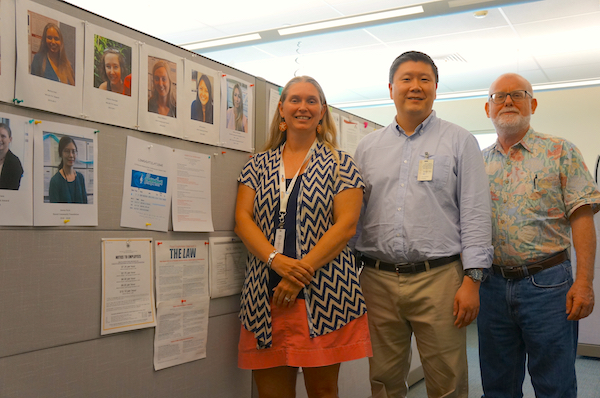
The Center for Cardiovascular Research at the University of Hawaiʻi John A. Burns School of Medicine (JABSOM) is hosting Dr. Wayne Wang of the National Institutes of Health this week. Dr. Wang is here to learn about our successful “T-32” training grant, which was recently renewed.
The “T-32” awards are made to institutions to support groups of pre- and/or postdoctoral fellows, including trainees in basic, clinical, and behavioral research. The goal is to ensure that a diverse and highly trained workforce is available to assume leadership roles in those fields. JABSOM’s Center for Cardiovascular Research (CCR) is in its sixth year of receiving grant funds, which have been successful in launching the independently-funded careers of several of the former CCR trainees. In fact, the photo above shows Dr. Wang, Dr. Rachel Boulay and Dr. Ralph Shohet standing in front of what Dr. Shohet likes to call “Independence Wall” — because it is lined with the photos of those now independently-funded scientists.
Dr. Wang is an NIH program officer with the National Heart, Lung, and Blood Institute. During his two-day visit to inspect and learn more about our JABSOM program, he met with nine post or predoctoral trainees, including Dr. Jason Higa, who is now an Assistant Professor here, and who was named the Achievement Rewards for College Students (AARC) Hawaiʻi Scientist of the Year in 2011. He also is meeting with scientists in Tropical Medicine, HIV/AIDS and Native Hawaiian Health at JABSOM and with Dr. Joe Ramos at the UH Cancer Center.
JABSOM and the Cancer Center are interested in replicating the success of the Cardiovascular Research Center’s “T-32” training program in other research units.
More about the Center for Cardiovascular Research
The Center for Cardiovascular Research (CCR) is a focal point for cardiovascular research in Hawaiʻi. The CCR is committed to developing tomorrow’s research leaders and educating the community. The CCR aims to enhance the understanding of cardiovascular biology and develop new treatments for disease. Research conducted by CCR investigators includes investigating heart and blood vessel diseases, developing new therapies, and studying diseases relevant in Hawaiʻi. The CCR also trains new investigators and clinicians, and offers educational opportunities to current high school teachers.